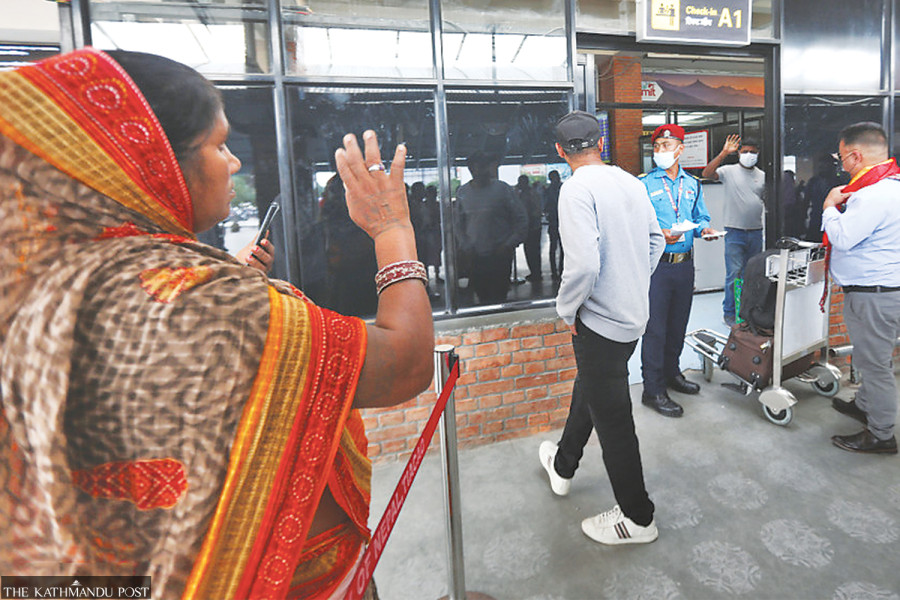Money
Escalating Middle East crisis threatens Nepali economy
Remittances, the biggest source of foreign currency, could take a hit along with trade and tourism, experts warn.
Krishana Prasain
Remittance-dependent Nepal may face a dizzying sequence of shocks, particularly in the labour market, due to escalating tensions in the Middle East following Iran's attack on Israel on Saturday, experts have warned.
Reports show that Tehran has warned it will strike again with greater force if Israel or the US retaliates for the Iranian strike on Israel. The Iranian attack, which involved more than 300 drones and missiles, were carried out on Saturday night.
In India, several leading airlines have cancelled flights to Iran and restricted their use of Israeli and Iranian airspace amid rapidly escalating tensions.
This has spurred worries for Nepal, which is mostly dependent on remittance earnings that make for a substantial portion of its economy.
Most rural households now depend on at least one member's earnings from employment abroad. Due to remittances, according to the latest living standard survey, the average annual spending on consumption rose by 66 percent in the past 12 years, reaching Rs126,172 in 2023 from Rs75,902 in 2011.
According to the Nepal Rastra Bank, the remittance inflow stood at $9.33 billion in the last fiscal year, the record-high earnings that have taken the country’s foreign exchange reserve to a historic high.
In the last fiscal year, 774,976 Nepali left the country for foreign jobs.
According to the Nepal Rastra Bank, the central bank, Qatar is the top source market for Nepal, hosting 133,262 workers in the last fiscal year, followed by the UAE (116,160), Saudi Arabia (112,777), Kuwait (43,508), Oman (5,294), Bahrain (7,690) and Jordan (1,019).
Israel hosted 1,084 Nepali workers in the last fiscal year.
Experts say that a crisis in the Middle East, which employs nearly half of the migrant workers from Nepal, will potentially hit Nepal and suggest preparing strategies to absorb the emerging geopolitical shocks.
“Tensions in the Middle East are not a good sign for a country like Nepal whose income largely depends on remittances,” said Ganesh Gurung, a migration expert.
Besides, say economists, conflict in the key oil-producing countries pushes up inflation.
The Asian Development Bank said in its recent report that any intensified geopolitical turmoil could disrupt supply chains, increasing global inflation and tightening financial conditions worldwide.
This may lead to tightening of domestic monetary policy, which will undermine investment and consumption and may drag down growth for the ailing Nepali economy.
“As we see, 1,200 to 1,500 Nepalis are leaving daily for Gulf countries for jobs. The conflict will stop many Nepalis from going to such countries. If these countries stopped hiring workers, the number of unemployed will rise,” said Gurung. “Greater unemployment at home could bring social disturbances.”
Experts say the decline in remittances will reduce Nepal’s foreign currency reserves, which may cause severe stress on the economy as domestic production has stagnated.
“The government needs to start preparing to absorb the potential shock,” said Gurung.
Some countries are already working out strategies to avoid potential economic impact.
On Sunday, the South Korean government announced heightened vigilance against potential domestic repercussions in light of the escalated tensions in the Middle East following Iran's attack on Israel, according to media reports.
Also on Sunday, the Embassy of Nepal in Tel Aviv, Israel issued a notice requesting Nepalis to follow the local protocol directed by the Israeli Home Front Command.
Nepal’s foreign ministry said in a statement that it is closely following the development in West Asia.
“We are seriously concerned at the rising tensions and escalation of hostilities in the region. The government of Nepal firmly believes in a peaceful resolution of disputes and deplores the use of force. We call on all the parties concerned to exercise maximum restraint and use dialogue and diplomacy to restore peace,” the embassy statement said.
Oil prices have also started going up.
On Sunday, the Brent crude oil price reached $90.21 per barrel. Oil rose 1 percent on Friday on geopolitical tensions in the Middle East.
Last week, oil prices neared a six-month high on concerns that Iran, the third-largest producer in the Organization of the Petroleum Exporting Countries (OPEC), might retaliate for a suspected Israeli warplane attack on Iran’s embassy in Damascus last Monday, according to the reports.
The conflict’s impact on global oil markets is significant, as any risk of supply disruptions could lead to a price hike. Nepal is still bearing the cost of high oil prices which has pushed up inflation.
Rising conflict has become a major concern for the disruption in the supply chain as Iran has threatened to shut down the Suez Canal. The disruption of shipping routes in the Red Sea will result in higher shipping costs, according to media reports.
The World Bank said in its recent report that the cost of shipping from Asia to Europe has jumped to over US$3,000 for a 40-foot container, a threefold increase over the lowest rate in 2023 (about US$1,000).
“The rise in tensions in the Middle East means trade disturbances globally,” said Chandramani Adhikari, an economist. “For Nepal, most of whose remittance comes from the Middle Eastern nations, it could spell disaster.”
The government is happy with the improvements in external sectors which is mostly due to the boost in remittance.
“But as soon as the labour markets get hit, there will be a direct impact on the country’s income,” said Adhikari. “People who are working in the conflict-hit countries might experience reduced savings due to the rise in the cost of living in the destination countries,” Adhikari said.
“The rise in tensions will have an impact on the tourist arrivals as countries will issue travel advisories,” Adhikari said.
“More polarisation among powerful economies, as they spend more on war, will also affect the foreign aid being provided to Nepal, besides foreign investment,” Adhikari said.
The international conflict also has the potential to strengthen the dollar.
The rise in oil prices and dollar rate will affect Nepal’s economy side-by-side as it impacts consumption and increases inflation, Adhikari said.
“So, all these phenomena will hit Nepal’s economy.”




 27.48°C Kathmandu
27.48°C Kathmandu















